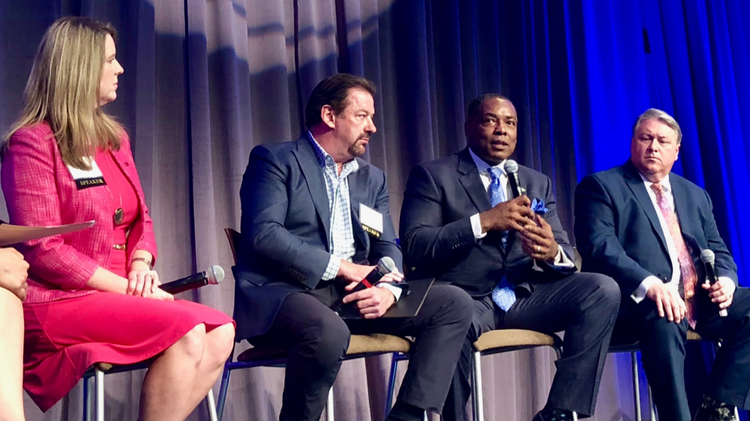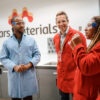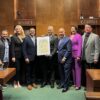From left: Frisco Mayor Pro-Tem Shona Huffman, McKinney Mayor George Fuller, Plano Mayor Harry LaRosiliere and Wylie Mayor Eric Hogue discussed strengths and challenges of their respective cities on the economic development front.
By Bill Hethcock, Dallas Business Journal
June 18, 2018
Plano is king of the corporate relocation. Frisco is known for blazing population growth and plentiful land. McKinney has quality schools and a city-owned airport full of corporate jets from companies like nearby Toyota. And Wylie has housing that families can afford and amenities they can enjoy.
It all adds up to economic prosperity and a high quality of life in most of Collin County, the fastest-growing county in the country, mayors of those cities said Friday in a Collin County Business Alliance luncheon on the Capital One campus in Plano.
But with 80 people moving into the county each day, the challenge is building affordable housing, schools, roads and other infrastructure fast enough and building the workforce necessary to keep up with the growth.
Corporate relocations and expansions drive economic development in Plano and have brought 32,000 jobs with a median income of over $75,000 into the city in the past five years, Mayor Harry LaRosiliere said.
Many of those people live in Plano’s surrounding communities. About 50,000 people per day come into Plano to work, he said.
“We would not be able to attract those companies had we not had ‘suburbs,’ for them to live in,” LaRosiliere said. “So truly for us, it’s about job creation and bringing major corporations and headquarters to provide economic prosperity for all.”
Wylie Mayor Eric Hogue said cities in Collin County need to work together and play off one another’s strengths for maximum economic impact.
“That’s where smaller cities like Wylie and Murphy and all of us need to get in and support the Planos and Friscos and McKinneys, because they are going to be the ones that attract the Toyotas and Liberty Mutuals,” Hogue said.
Frisco Mayor Pro Tem Shona Huffman said Frisco, unlike some surrounding communities, is only about 60-percent built out. So an abundance of land is the fast-growing city’s economic ace in the hole.
“You can bring your dreams to Frisco and build it to suit,” she said. “Which means we’re not trying to infill, and we’re not trying to create something that won’t work for a lot of companies. We’ve got a lot of room.”
Companies that are expanding are increasingly looking for places where they can build large campuses instead of retrofitting older campuses, she said. Frisco has one piece of land that’s 2,500 acres and has a single owner that is about to be developed, she said.
“That’s an opportunity of a lifetime for companies to come and grow in a way they just couldn’t do in other places,” she said.








